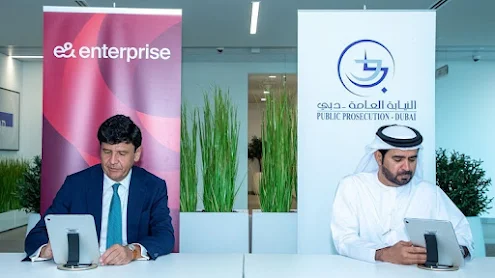The
chances of "Unified Remote" court hearings and investigations
into one digital platform in GCC countries are looking promising,
especially with recent developments in Dubai. The Dubai Public Prosecution
(DPP) has announced a partnership with tech solutions provider e&
Enterprise
to create a centralized digital platform that will streamline
remote investigations and court hearings1. This initiative is set to enhance
the efficiency of the justice system, promising faster processing times and a
more efficient system overall.Dubai prosecution and e&Enterprise are signing an agreement
Scheduled for completion by 2026, the platform will be the first of its kind in the world and will include features such as centralized storage, archiving capabilities, and the capacity to schedule remote interviews and reserve spaces in multiple locations. It will also improve communication among prosecutors, lawyers, translators, witnesses, and other parties involved while maintaining strict confidentiality and privacy standards.
This project represents a significant step towards a more accessible, efficient, and progressive vision of law in an interconnected and rapidly evolving world. It’s a clear indication that the GCC countries are moving towards modernizing their legal systems with the help of technology
Unify remote court hearings, and investigations in one digital platform chances in GCC countries.
The
chances of unifying remote court hearings and investigations into one digital
platform in GCC countries are looking promising, especially with recent
developments in Dubai. The Dubai Public Prosecution (DPP) has announced
a partnership with tech solutions provider e& Enterprise to create a
centralized digital platform that will streamline remote investigations and
court hearings. This initiative is set to enhance the efficiency of the
justice system, promising faster processing times and a more efficient system
overall.
How will this platform handle evidence presentation during remote hearings?
The handling of evidence presentation during remote hearings in the U.A.E is guided by several regulations and protocols to ensure the integrity and effectiveness of the judicial process. Here’s how the platform is expected to manage evidence presentation:
Virtual Litigation: The U.A.E courts have adopted virtual litigation to ensure justice is served while maintaining public health measures. This includes the use of electronic channels for court hearings, where evidence can be presented remotely.
Regulations and Amendments: Federal Law No. 5 of 2017 on the
Use of Telecommunication in Criminal Proceedings allows the use of remote
communication technology in criminal procedures, including evidence
presentation involving all parties. Additionally, amendments to the Law on
Evidence in Civil and Commercial Transactions have introduced remote
communication technologies in evidence-related procedures.
Digital Pleading:
The digital pleading process involves the exchange of defenses, arguments,
evidence, and requests using memoranda, documents, previous judicial rulings,
and evidence through a virtual platform.
Evidence Bundling Protocol: The DIFC Courts’ Virtual Hearing and
Bundling Protocol provides guidance on how to prepare and present evidence
during virtual hearings, ensuring that all relevant materials are accessible
and presented in an orderly manner.
These
measures are designed to maintain the standards of a fair trial, including the
proper presentation and examination of evidence, even when proceedings are
conducted remotely. The platform will likely incorporate features that allow
for the secure upload, storage, and sharing of evidence, as well as
functionalities to present evidence live during virtual hearings, ensuring that
all parties have the necessary access and that the evidence is handled in
compliance with legal standards.
How will the platform handle the cross-examination of witnesses remotely?
Cross-examination
of witnesses remotely presents unique challenges, especially in virtual court
proceedings. Here are some considerations for handling cross-examination
effectively:
Virtual Setting Challenges:
Remote
trials lack the physical elements of a traditional courtroom, such as
atmosphere, live confrontation, and spectators.
The absence of these elements can impact both witnesses and lawyers during cross-examination.


No comments:
Post a Comment